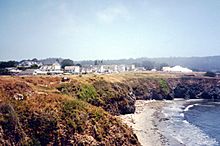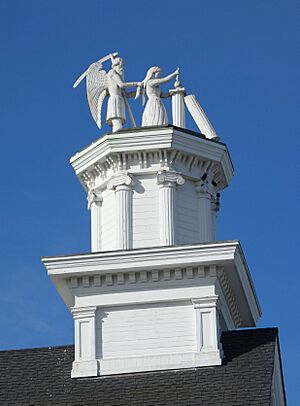Mendocino, California facts for kids
Quick facts for kids
Mendocino, California
|
|
|---|---|
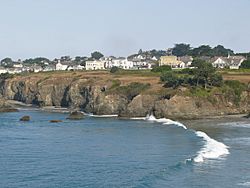
Mendocino, California
|
|
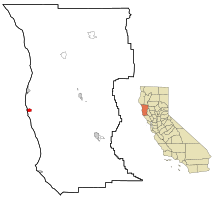
Location in Mendocino County and the state of California
|
|
| Country | United States |
| State | California |
| County | Mendocino |
| Area | |
| • Total | 3.032 sq mi (7.85 km2) |
| • Land | 2.257 sq mi (5.85 km2) |
| • Water | 0.775 sq mi (2.01 km2) 25.56% |
| Elevation | 154 ft (47 m) |
| Population
(2020)
|
|
| • Total | 932 |
| • Density | 412.9/sq mi (159.4/km2) |
| Time zone | UTC-8 (Pacific (PST)) |
| • Summer (DST) | UTC-7 (PDT) |
| ZIP code |
95460
|
| Area code(s) | 707 |
| FIPS code | 06-46814 |
| GNIS feature ID | 1659106 |
Mendocino is a small town in Mendocino County, California. Its name comes from Cape Mendocino, which was named after Antonio de Mendoza, a leader in New Spain long ago. Even though it's small, Mendocino is very popular. It sits on a beautiful piece of land surrounded by the Pacific Ocean. This makes it a favorite spot for artists and people on vacation.
Mendocino is about 10 miles south of Fort Bragg. It is about 154 feet above sea level. For counting purposes, the U.S. Census Bureau calls Mendocino a "census-designated place" (CDP). This means it's a community that looks like a town but isn't officially incorporated. In 2020, about 932 people lived there.
Template:TOC limit=3
Contents
Exploring Mendocino's Past
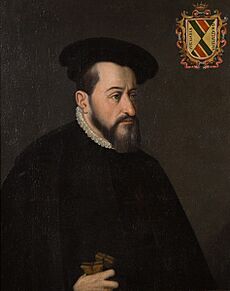
Before 1850, a Native American group called the Pomo lived near Mendocino. Their settlement was called Buldam.
In 1850, a ship named the Frolic crashed a few miles north of Mendocino. People investigating the wreck discovered the area's rich timber. This led to the start of the logging industry.
Mendocino was founded in 1852 as a logging town. It was first called "Meiggsville" after Henry Meiggs, a businessman. Over time, it had other names like "Big River" and "Mendocino City." The current name was finally chosen. The first post office opened in 1858. Many early settlers came from New England. Portuguese fishermen from the Azores also settled here. People from Canton Province in China also moved to Mendocino. They built the Taoist Temple of Kwan Tai in town.
Between 1940 and 1950, Mendocino's population grew a little. In 2021, the town faced a water shortage. Businesses had to bring in their own drinking water.
Mendocino's Location and Environment
California State Route 1 (Shoreline Highway) runs along the east side of Mendocino's downtown. This road goes north 10 miles to Fort Bragg. It also goes south 29 miles to Manchester. Another road, Comptche-Ukiah Road, heads east from Route 1. It crosses the California Coast Ranges. This road leads 14 miles to Comptche and 44 miles to Ukiah. Ukiah is the main city in Mendocino County.
The Big River forms the southern edge of the community. It flows into the Pacific Ocean at Big River Beach. This beach is part of Mendocino Headlands State Park. It's just a short distance south of the town center.
The Mendocino area, as defined by the Census Bureau, covers about 3.0 square miles. About 2.3 square miles of this is land. The remaining 0.8 square miles, or 25.56%, is water.
In 2021, some of the natural underground water sources (aquifers) that supply the town started to fail. Wells in the area are usually 8 to 30 feet deep. One well was dug 165 feet deep but still didn't find water. Now, water is brought into Mendocino by large trucks. Local businesses have also installed special toilets to save water.
Weather in Mendocino
Mendocino has mild summers with lots of fog. Temperatures are usually in the upper sixties. Nights are cooler, in the fifties. Winters are also mild. It rarely freezes or snows because the town is so close to the Pacific Ocean. Mendocino gets about 43 inches of rain each year. Most of this rain falls in the fall, winter, and spring. Sometimes, it rains in early summer too.
Mendocino has a "warm-summer Mediterranean climate." This means it has warm, dry summers and mild, wet winters.
People of Mendocino
In 2010, Mendocino had a population of 894 people. Most residents, about 93.3%, were White. There were also smaller groups of African American, Native American, and Asian residents. About 4.7% of the people were Hispanic or Latino.
Most people lived in regular homes. A small number lived in group housing. There were 447 households in total. About 13.9% of these homes had children under 18. Many households (39.6%) were married couples. About 39.8% of households were single people. Of those, 18.6% were people aged 65 or older living alone. The average household had 1.86 people.
The median age in Mendocino was 56.1 years. This means half the people were older than 56.1 and half were younger. About 10.4% of the population was under 18. About 27.3% were 65 or older.
What Mendocino is Known For
Mendocino has many hotels and bed and breakfasts. Its downtown area faces the ocean. Here you can find many art galleries, shops, and restaurants.
Mendocino is one of many California towns dealing with a serious water shortage. Many of the town's wells, which are its main water source, have dried up. So, water is brought in by trucks. This costs 20 to 45 cents per gallon. There are worries that nearby towns might stop selling water to Mendocino. For example, Fort Bragg, 10 miles north, stopped selling water in July 2021 because of its own water problems.
Arts and Culture
After the Mendocino Art Center started in 1959, Mendocino became a hub for art. This "art renaissance" lasted for forty years. It was led by artist and developer Bill Zacha.
Most of the town was added to the National Register of Historic Places in 1971. This means it's a special historic area. The Mendocino Presbyterian Church on Main Street is very old. It was built in 1868 and is one of California's oldest churches still in use. It is a California Historical Landmark. The Temple of Kwan Tai on Albion Street is also a California Historical Landmark. It might be as old as 1854 and is one of the oldest Chinese places of worship in California.
Since 1987, Mendocino has hosted the Mendocino Music Festival. This festival features classical music and other styles. It takes place every year in a large tent on Main Street, within the Mendocino Headlands State Park.
The Kelley House Museum in Mendocino has a cannon from the Frolic ship.
The Mendocino Film Festival began in May 2006. Since the area has many artists, the festival has a special "artist category." It also shows documentaries, feature films, and short films.
Fun Things to Do in Mendocino
Friendship Park is a local sports field. Volunteers built it, and it opened in April 1993.
State Parks Nearby
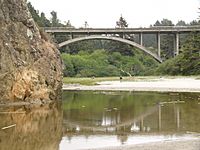
- Mendocino Headlands State Park
- Mendocino Woodlands State Park
- Russian Gulch State Park
- Point Cabrillo Light Station
Learning in Mendocino
Mendocino is part of the Mendocino Unified School District.
Mendocino's Sister City
Mendocino has a sister city relationship with Miasa, Japan. This friendship started between Mendocino artist Bill Zacha and Japanese artist Tōshi Yoshida. It became official in 1980. Every two years, students from Miasa visit Mendocino middle school students.
See also
 In Spanish: Mendocino (California) para niños
In Spanish: Mendocino (California) para niños
 | Georgia Louise Harris Brown |
 | Julian Abele |
 | Norma Merrick Sklarek |
 | William Sidney Pittman |



